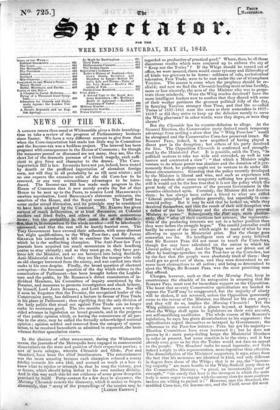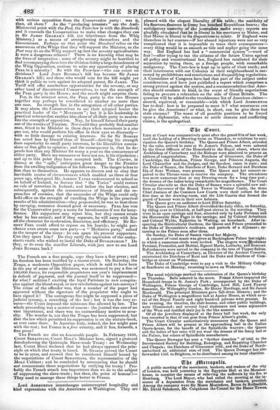In the absence of other amusement, during the Whitsuntide recess,
the journals of the Metropolis have engaged in controversial dissertations on the state and position of their respective parties; a sort of town eclogue, wherein Chronicle and Globe, Post and Standard, have been the chief interlocutors. The entertainment was the more amusing because each champion evinced a scanty fidelity towards his own idol, and seemed so much at a loss to know what to rejoice or triumph in, that he sang the victory, past or future, which should bring defeat to his own tutelary divinity. And in this way each side let out evidence of some gross deception practised by itself. Party-contest for a few days in abeyance, the Morning Chronicle renews the discovery, which it makes or forgets alternately, that " many of the proceedings of the session may be regarded as productive of practical good." Where, then, be all those disastrous results which were conjured up to enforce the cry of " Keep out the Tories" ? If the Whigs should be turned out of office, we were assured, there would ensue tyranny and illiberality of all kinds too grievous to be borne : mildness of rule, ecclesiastical toleration, Free Trade, were to be cast under the car of triumphant Toryism. The season is come when the prophecy should be re- alized; and now we find the Chronicle lauding more or less forcibly, more or less sincerely, the acts of the Minister who was to perpe- trate those misdeeds. Were the Whig oracles deceived? have the more intelligent leaders now to confess that they shared with some of their weaker partisans the grossest political folly of the day, in fancying Toryism stronger than Time, and that the so-called Tories of 1837-1841 were the same as their namesakes in 1817- 1819 ? or did they strive to keep up the delusion merely to serve the Whig placemen? in other words, were they dupes, or were they cheats?
But the Chronicle has its counter-delusion to allege. At the General Election, the Conservative party derived much temporary advantage from making a show that the " Whig Poor-law" would be abrogated and the Conservative Corn-law preserved intact. Sir ROBERT PEEL, indeed, is now acquitted of having played a direct part in the deception ; but others of his party deceived for him. The Opposition Chronicle is confirmed and strength- ened by the Ministerial Post. It is possible, saith the Tory, "in- political matters to take too wide and extended, as well as too narrow and contracted a view": " that which a Minister might venture to do whose power was absolute and the duration of it per-. manently fixed, he perhaps ought not to venture to do under dif- ferent circumstances. Granting that the policy recently developed by the Minister is liberal and wise, and such as experience will one day confirm after some temporary suffering has passed away, still it would not be the less true that it is not the policy which the great body of the supporters of the present Government in the "counties calculated upon. Certainly, the Minister did not deceive them : he has always been rather a friend to what are called Liberal principles' in politics generally, but especially in com- mercial policy. But it may be said that he looked on, while they deceived themselves, and that the result of their self-deception was a defeat of the late Ministry and the elevation of the present Ministry to power." Subsequently the Post says, more passion- ately, that " after all their exertions last summer, the representa- tives of the producing interests are not in a better position than they were before the struggle began." The candid journalist could hardly be aware of the use which might be made of what he was allowing to appear in Ministerial print. But the charge goes 'somewhat too far. No intelligent man of any party believed that Sir ROBERT PEEL did not mean to touch the Corn-laws, though few may have calculated on the extent to which his Liberal policy would go. And the Whigs were not driven out of office by hustings-speeches on the Poor-law or the Corn-law, but by the fact that the people were absolutely tired of them : they could get no good out of them, and they were determined to re- move inert obstructions to all action; and being so determined to eject the Whigs, Sir ROBERT PEEL was the most promising man that offered.
Charges, however, such as that of the Morning Post, keep in countenance the chuckle of its antagonists in assuming that Sir ROBERT PEEL must rest for immediate support on the Opposition. The boast that seventy Conservative agriculturists are banded to oppose the Tariff may be exaggerated, but the majority of ninety will be shaken, if not reversed, unless the Opposition generously come to the rescue of the Minister, too liberal for his own party : and they will do so, implies the Morning Chronicle! Yet the Whig politician cannot resist a glance beyond, at happier days, when the Whigs shall again be legislators on their own account-, not self-sacrificing auxiliaries. The whole course of Sir ROBERT'S legislation, he says, has given dissatisfaction to his supporters : the agriculturists regard themselves as betrayed by Government ; the adherence to the Poor-law irritates : PEEL has got his majority— Election Committees have even increased it ; but he does not govern by it : mere party-feeling keeps the Ministerial Members in order at present, but some reaction is in the vista ; and it has already even gone so far that the Tories would not dare an appeal to the people. The Standard tasks its usual ingenuity, and finds indeed a reply to this representation, more ingenious than effective.
The dissatisfaction of the Ministers' supporters, it says, arises from the fact that his measures are identical in kind, and only different in degree from those of the Whigs ; that is to say, the " iucreas- ing majority" are more hostile to the Whig-Radical party than to the Conservative Ministry ; "a proof, an incontestable proof of strength;" " for surely that host is the strongest in which the main
body is more eager to engage with the enemy than its more cautious leaders are willing to permit it I " However, says the Standard, the modified Corn-law, the Income-tax, and the Tariffi never did meet with serious opposition from the Conservative party : was it, then, all sham ? As the "producing interests' are the Anti- Ministerial point with the Post, the Poor-law is with the Standard;
and it counsels the Conservatives to make what changes they can in Sir James GRAHAM'S bill, (an inheritance from the Whig Ministry,) as a means of strengthening themselves and the
Government. Perhaps on that point the Standard relies on the assurances of the Whigs that they will support the Minister, as The Post may do on the Whig support against the seventy agriculturists.
It were a dangerous reliance! There is no knowing what may be the force of temptation : some of the seventy might be horrified to find accompanying them into the division-lobby a large detachment of the Whig Opposition, anxious to mile any opportunity of placing PEEL in a minority ! So with the Poor-law—who can count on &visions ? Lord Joins RUSSELL'S bill has become Sir JAMES Ga.saest's bill; and those who would vote for the bill might yet think it politic to vote against its adopted parent, Sir JAMES. The Tariff will offer numberless opportunities for the seventy, or any other band of discontented Conservatives, to test the strength of the PEEL party in the House ; and the result might surprise them. For, in the strictest sense, the PEEL party in the two Houses together may perhaps be considered to number no more than one man. Its strength lies in the antagonism of all other parties. It may alarm the Conservatives to see their adopted leader the practical leader of the " Movement "; but it is his leadership in practical reforms that enables him alone of all their party to neutra- lize the strength of opposition. Nay, he himself formed their party out of the wrecks of Toryism. Nor could they probably find another
man, fitted to be Minister in these days when movement is a sine gua non, who would perform his office in their eyes so discreetly— with so little damage to existing interests. So far Sir ROBERT
has acted less by himself than of himself—deriving his strength from superiority to small party interests, be his liberalities conces- sions or free gifts to opinion ; and the consequence is, that he de- pends less than any Minister for many a year on the concurrence of
either party. Have my measures or have not me, is his stipulation ; and up to this point they have accepted both. The Courier, in
dismay at the " split," anticipates great danger to the Premier from the swelling indignation of his followers. The danger is less to him than to themselves. He appears to discern and to obey that inevitable course of circumstances which enabled us three or four years ago, when good Mr. Assrosi YATES endeavoured to school us on behalf of Ireland, to foresee that " the Tories" could restore no rule of terrorism in Ireland ; and before the last election, and subsequently, against the remonstrances of friends and the re-
proaches of enemies, that the succeeder of the Whigs could only hold office on the strength of excelling the Whigs in the practical results of his administration—they propounded, he was to beat them by carrying, measures deemed good or necessary. PEEL has won
for the Conservative party a name for harmlessness if not for bene- ficence. His supporters may reject him, but they cannot retain what he has earned; and if they separate, he will carry with hint
all the character for moderation, discretion, and efficiency. Sir Ro- BERT Prom could afford to repose on his laurels ; he might per- chance even create some new party—a " Mediative party," suited to the temper of the times : he can spare his present supporters. Can they spare him ? Do they ratify the aspiration of the enthu- siastic rustic who wished to instal the Duke of BUCKINGHAM ? Do they, or do even the sturdier Liberals, wish just now to see Lord Jona Rvsssist. back ?



























